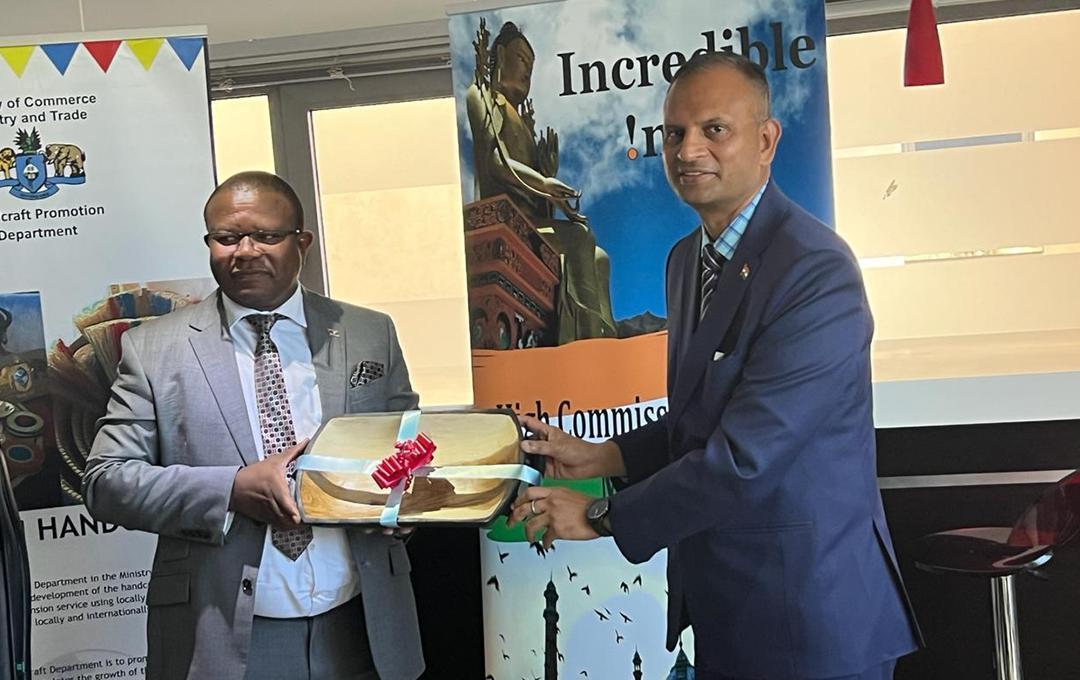Africa-Press – Eswatini. Eswatini and India have pledged to strengthen their trade ties, building on a 2002 agreement that grants Most Favoured Nation (MFN) status to both countries.
Granting MFN status is a trade agreement between two countries and essentially means treating each other equally in terms of trade benefits.
Countries with MFN status typically offer each other their lowest available tariffs on imported goods, making it cheaper for each country to buy products from the other.
The benefits are extended as any special trade concessions like lower tariffs negotiated with a third country must also be extended to all MFN partners.
The commitment was renewed yesterday during an event attended by Minister of Commerce, Industry and Trade Manqoba Khumalo and the High Commissioner of India in Eswatini N. Ram Prasad at the Eswatini Investment Promotion Authority (EIPA) Headquarters.
This was during a press conference on Eswatini’s participation to the Surajkund International Mela Crafts Fair in India.
High Commissioner Prasad expressed India’s desire to expand exports beyond handicrafts, into various other sectors.
“We look forward to increasing exports not only in the field of handicrafts, which is but a small part, but in various fields also,” he said.
He even presented a copy of the existing trade agreement to the minister, suggesting a joint review to identify areas for further collaboration.
“For this to be implemented, we have an institutional mechanism which I brought with me. I am pleased to have joined the committee to boost trade between India and Eswatini,” he said.
Ventures
Minister Khumalo welcomed the proposal, highlighting the potential for joint ventures.
He said the Surajkund International Crafts Mela in India was an opportunity for Eswatini to showcase its products and gain exposure to new markets.
The Mela, as highlighted by the Principal Handicraft Officer Zodwa Vilakati, provided valuable knowledge exchange for Eswatini delegates.
She said they were able to learn innovative uses for bamboo, a material readily available in Eswatini, including the creation of eco-friendly products like pads, straws, and even skincare items.
Vilakati emphasized how this knowledge could empower Eswatini’s bamboo growers.
“Previously lacking guidance on commercialisation, the ministry can now offer valuable advice, potentially creating a new avenue for economic development,” she said.
Eswatini takes centre stage at Surajkund International Mela Crafts Fair
THE Kingdom of Eswatini’s participation in the recent Surajkund International Mela Crafts Fair in New Delhi, India, was a resounding success.
Over 500 visitors a day flocked to the Eswatini stall, making it the busiest of the entire fair.
This is according to Principal Handicraft Officer Zodwa Vilakati, who attributed this overwhelming response to the captivating display of handcrafted items.
“People were drawn in to appreciate the products. A big hit was our ‘natural needs from trees’ collection, featuring entirely organic and handmade items.
“The appeal was evident across age groups, with even young children showing keen interest in Eswatini’s unique crafts,” Vilakati said.
She said the Eswatini stall attracted not just visitors but also dignitaries, adding that these included former Indian high commissioner’s Radha Venkataraman whose visit served as a mark of appreciation for their participation.
Also visiting was Eswatini’s Ambassador to Malaysia Menzi Dlamini, who offered valuable advice during his visit.
“He encouraged us to be vigilant and look beyond existing crafts, the ambassador further suggested exploring educational avenues to develop a wider range of skills and make a significant impact in Eswatini.
This resonated with the ministry’s vision for future endeavours,” she said.
She added that they also visited other stalls to see what others were doing.
“We noticed leather and metal toys, which we don’t currently produce, as well as mats made from calabashes, hold potential for future production,” she said.
Meanwhile, Minister of Commerce, Industry and Trade Manqoba Khumalo said this participation was made possible by the continued bilateral relations between the Kingdom of Eswatini and the Republic of India.
“The Eswatini booth became a hub of curiosity and appreciation,” Khumalo remarked.
The delegation consisted of talented artisans, skilled craftsmen, and passionate individuals, who are deeply committed to preserving and promoting our traditional crafts, according to the minister and ‘together, they carried the spirit of our nation and its unique cultural heritage’.
“Visitors were captivated by the intricate beadwork, delicate wood carvings, and vibrant textiles.
The fusion of traditional Swazi designs with contemporary influences was particularly admired, sparking conversations about the beauty and cultural significance of our crafts.
“Our team interacted and collaborated with artisans from various countries,” explained Khumalo.
He emphasised that the exchange of ideas, techniques, and experiences enriched their knowledge and fostered a global understanding of traditional crafts.
“We formed new friendships, uniting in our shared passion for preserving cultural heritage,” he said.
For More News And Analysis About Eswatini Follow Africa-Press







